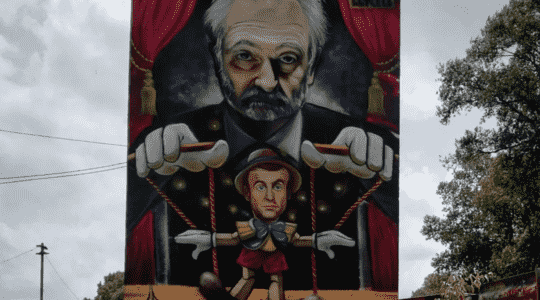The huge fresco sparked a lively controversy. Appeared a fortnight ago on the side of a water management building at the entrance to Avignon (Vaucluse), it represents the writer and economist Jacques Attali pulling the strings of a puppet with the face of Emmanuel Macron. baptized The Beast 2 and signed by the artist Lekto, already known for controversial political caricatures, the work was quickly qualified as anti-Semitic by various associations, public figures and Internet users, outraged by the allusion mentioned. “Can the town hall of Avignon tell us who authorized or ordered this anti-Semitic fresco, and why it is still there?”, In particular, questioned on Twitter the association American Jewish Committee, which fights against racism and racism. anti-Semitism.
But despite the protests, the city and the urban community of Greater Avignon – owner of the building – initially considered not to erase this fresco, invoking “freedom of expression” and believing that “everyone can interpret the image as he wants since there are no words on this wall”. Finally, the work will be covered this Friday in the face of “the insistence of the prefect”, indicated this morning France Bleu Vaucluse. But the symbol is indelible. “I cannot explain the time it took the competent authorities to react”, comments Jean-Yves Camus, political scientist and co-director of the Observatory of political radicalism. The far-right specialist is clear: “There is no doubt that this fresco is anti-Semitic, and what it suggests is totally harmful”.
L’Express: In what way is this fresco anti-Semitic in your opinion?
Jean-Yves Camus: She is anti-Semitic without a doubt, I don’t put a conditional on it. And this for a fairly simple reason: it uses all the clichés of an extremely old anti-Semitic theory, according to which political life is a puppet theatre. There would exist within this theater visible holders of power, who would be manipulated or put in place by invisible holders of power, a kind of hidden elite… Who would happen to be Jewish. The supreme intelligence of the Jews being, according to this theory, not to assume power by themselves, but to always be in the role of string pullers.
I believe that it is perfectly permissible to contradict Jacques Attali on his ideas, to express disagreements on his vision of the world, just as one can do with Georges Soros for example… But from the moment when Jacques Attali today, and Georges Soros yesterday, are portrayed as string pullers in a kind of fictional political game that would give citizens the impression that they are electing their representatives when in reality they are electing puppets, we are facing to an absolutely anti-Semitic work. What this fresco suggests is totally harmful, especially since it was drawn in the public space, in full view of everyone.
What conspiratorial references can be found on this fresco?
Of course, conspiracy and anti-Semitic theories always go hand in hand. There, it is the image of the puppet and the string puller. At the moment, a sentence attributed to Jacques Attali is circulating a lot on social networks to justify this theory. “Macron, I invented it,” he would have said. Besides the fact that Emmanuel Macron did not become president thanks to Jacques Attali but thanks to the vote of the French, we are right in the conspiracy theory that a man of influence, Jewish as it happens, would have fabricated ex nihilo a man who would have become President of the Republic by his own grace. For what purpose and by what means? The question remains open… Besides the fact that it’s insulting to the President of the Republic and politically stupid, it’s an anti-Semitic process that dates back to the 19th century. One can find a whole literature dating from this time which explains that the governments are in the hands of Jewish advisers, that they are only the executors without their knowledge or of their own free will of a plan of world domination hatched by the Jews … The central theme is manipulation, conspiracy. And these are the symbols that we find in this fresco.
If the work will finally be erased, the city of Avignon and the urban community first invoked “freedom of expression” to justify its presence. What do you think ?
Freedom of expression is fundamental, but it is never absolute. This is why it is framed by law, for the good of all and the serenity of public order. Freedom of expression does not give the right to make insulting remarks about someone or to defame a person, nor does it allow the denial of the genocide of the Jews, for example. The law provides penalties if you do so publicly or through the press. So from the moment it is indisputable – and I would like to hear the arguments of people who claim the opposite! – that this fresco is inspired by the old anti-Semitic pattern of conspiracy theory, it must be erased. Especially since its size and location make it visible to a large number of Avignon residents and tourists. Moreover, I cannot explain the time it took the competent authorities to react: there is no shadow of a doubt that in this context, freedom of expression must be limited.
